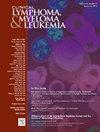异基因造血干细胞移植后TKI维持治疗对费城染色体阳性急性淋巴细胞白血病p190和p210转录物复发的影响:一项多中心研究
IF 2.7
4区 医学
Q2 HEMATOLOGY
引用次数: 0
摘要
目的:分析费城染色体阳性急性淋巴细胞白血病(Ph + ALL)患者异体造血干细胞移植(HSCT)后酪氨酸激酶抑制剂(TKI)维持治疗对2个转录本p190和p210复发率和预后的影响。方法:我们对58例经HSCT诊断为Ph + ALL的患者的临床资料进行了回顾性分析。所有患者在移植后造血重建后均接受TKI维持治疗。我们比较了两种转录类型p190 (n = 43)和p210 (n = 15)的临床特征和预后差异。结果:在临床特征方面,两种转录本患者之间无显著差异。多因素分析显示,T3151突变(HR = 5.021, 95% CI [1.129-22.3], P = 0.034)是影响移植后无复发生存(RFS)的独立危险因素。此外,TKI维持治疗超过1年被确定为RFS的保护因素(HR = 0.315, 95% CI [0.115-0.86], P = 0.025)。p190组的中位RFS为89.4个月,而p210组为59.1个月,差异有统计学意义(P = 0.031)。在TKI维持治疗超过1年的亚组中,p190和p210的中位RFS时间分别为95.3个月和90.5个月,RFS差异无统计学意义(P = 0.080)。结论:与p210组相比,p190组RFS更长。然而,通过诱导缓解后的早期HSCT和移植后长期TKI维持治疗,p210相关的不良预后可以得到缓解,导致两种转录物之间的结果趋于相等。本文章由计算机程序翻译,如有差异,请以英文原文为准。
Effect of TKI Maintenance Therapy After Allogeneic Hematopoietic Stem Cell Transplantation on Recurrence of Philadelphia Chromosome‐Positive Acute Lymphoblastic Leukemia p190 and p210 Transcripts: A Multicentre Study
Objective
To analyze the impact of tyrosine kinase inhibitor (TKI) maintenance therapy following allogeneic hematopoietic stem cell transplantation (HSCT) in patients with Philadelphia chromosome-positive acute lymphoblastic leukemia (Ph + ALL) on recurrence rates and prognosis for the 2 transcripts, p190 and p210.
Methods
We conducted a retrospective analysis of clinical data from 58 patients diagnosed with Ph + ALL who underwent HSCT. All patients received TKI maintenance therapy following hematopoietic reconstruction post-transplantation. We compared the clinical characteristics and prognostic differences between 2 transcript types: p190 (n = 43) and p210 (n = 15).
Result
In terms of clinical characteristics, no significant differences were observed between patients with the 2 transcripts. Multivariate analysis revealed that the T3151 mutation (HR = 5.021, 95% CI [1.129-22.3], P = .034) was an independent risk factor for relapse-free survival (RFS) post-transplantation. Additionally, TKI maintenance therapy for over 1 year was identified as a protective factor for RFS (HR = 0.315, 95% CI [0.115-0.86], P = .025). The median RFS was 89.4 months for the p190 group compared to 59.1 months for the p210 group, which was statistically significant (P = .031). In the subgroup with more than 1 year of TKI maintenance therapy, the median RFS times for p190 and p210 were 95.3 and 90.5 months, respectively, with no statistically significant difference in RFS (P = .080).
Conclusion
The p190 group demonstrated longer RFS compared to the p210 group. However, with early HSCT following induction remission and long-term TKI maintenance therapy post-transplant, the poor prognosis associated with p210 could be mitigated, leading to a trend towards equivalence in outcomes between the 2 transcripts.
求助全文
通过发布文献求助,成功后即可免费获取论文全文。
去求助
来源期刊

Clinical Lymphoma, Myeloma & Leukemia
ONCOLOGY-HEMATOLOGY
CiteScore
2.70
自引率
3.70%
发文量
1606
审稿时长
26 days
期刊介绍:
Clinical Lymphoma, Myeloma & Leukemia is a peer-reviewed monthly journal that publishes original articles describing various aspects of clinical and translational research of lymphoma, myeloma and leukemia. Clinical Lymphoma, Myeloma & Leukemia is devoted to articles on detection, diagnosis, prevention, and treatment of lymphoma, myeloma, leukemia and related disorders including macroglobulinemia, amyloidosis, and plasma-cell dyscrasias. The main emphasis is on recent scientific developments in all areas related to lymphoma, myeloma and leukemia. Specific areas of interest include clinical research and mechanistic approaches; drug sensitivity and resistance; gene and antisense therapy; pathology, markers, and prognostic indicators; chemoprevention strategies; multimodality therapy; and integration of various approaches.
 求助内容:
求助内容: 应助结果提醒方式:
应助结果提醒方式:


